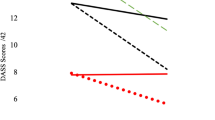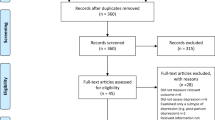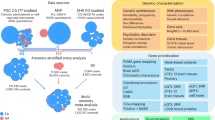Abstract
Recurrent, early-onset, major depressive disorder (RE-MDD) is a strongly familial condition whose malignant effects have a significant negative impact on the health and longevity of patients and their family members. Sixteen of the 19 candidate susceptibility loci identified by a recent genome survey revealed allelic associations with RE-MDD in men or women, but not in both sexes. The association of D2S2944 alleles and genotypes with RE-MDD and related disorders was evaluated using a case-control study design employing 100 adults with RE-MDD and 100 adult controls who had no personal or family history of mental disorders. The results of the case-control study were subsequently evaluated in a sample of 81 families ascertained through probands with RE-MDD using the transmission/disequilibrium test. The frequency of the D2S2944 124-bp allele among women with RE-MDD was approximately three times that for female controls (P = 0.0003). Women who carried the D2S2944 124-bp allele revealed a significantly elevated risk of developing RE-MDD, as indicated by an odds ratio of 4.5 compared to female controls (P<0.001). In contrast, men with RE-MDD did not have an increased frequency of this allele compared to male controls, and men who were carriers did not exhibit an increased risk of developing RE-MDD or related disorders. Our findings also suggest that the D2S2944 124-bp allele increases the risk of alcohol and other substance use disorders among women with RE-MDD. The transmission/disequilibrium test provided confirmatory evidence of these sex-specific findings within families. The results of this study confirm the existence of sex-specific susceptibility loci for RE-MDD, and suggest that there may be important differences in the molecular pathophysiology of RE-MDD in men and women. Alternatively, our findings may reflect the existence of sex-specific differences in the molecular mechanisms that determine resilience to endogenous or environmental depressogenic stimuli. The identification and characterization of the D2S2944 susceptibility locus for RE-MDD and related substance use disorders is likely to provide important new insights into the clinical biology, treatment, and prevention of these disorders.
This is a preview of subscription content, access via your institution
Access options
Subscribe to this journal
Receive 12 print issues and online access
$259.00 per year
only $21.58 per issue
Buy this article
- Purchase on Springer Link
- Instant access to full article PDF
Prices may be subject to local taxes which are calculated during checkout
Similar content being viewed by others
References
American Psychiatric Association. Diagnostic and Statistical Manual of Mental Disorders, 4th edn American Psychiatric Association: Washington DC 1994
Moldin SO, Reich T, Rice JP . Current perspectives on the genetics of unipolar depression Behav Genet 1991 21: 211–242
Robins LN, Regier DA . Psychiatric Disorders in America: The Epidemiologic Catchment Area Study The Free Press: New York 1991
Tsuang MT, Faraone SV, Green RR . Genetic epidemiology of mood disorders. In: Papolos DF, Lachman HM (eds). Genetic Studies in Affective Disorders Wiley: New York 1994
Angst J, Angst F, Stassen HH . Suicide risk in patients with major depressive disorder J Clin Psychiatry 1999 60(Suppl 2): 57–62
US Public Health Service. The Surgeon General's Call to Action to Prevent Suicide Washington, DC 1999
Zubenko GS, Zubenko WN, Spiker DG, Giles DE, Kaplan BB . The malignancy of recurrent, early-onset major depression: a family study Am J Med Genet (Neuropsychiatr Genet) 2001 105: 690–699
US Department of Health and Human Services. Mental Health: A Report of the Surgeon General – Executive Summary US Department of Health and Human Services, Substance Abuse and Mental Health Services Administration, Center for Mental Health Services, National Institutes of Health, National Institute of Mental Health: Rockville, MD 1999
Murray CJ, Lopez AD . Evidence-based health policy: lessons from the Global Burden of Disease Study Science 1996 274: 740–743
Torgensen S . Genetic factors in moderately severe and mild affective disorders Arch Gen Psychiatry 1986 43: 222–226
McGuffin P, Katz R, Rutherford J . Nature, nurture and depression: a twin study Psychol Med 1991 21: 329–335
Kendler KS, Neale MC, Kessler RC, Heath AC, Eaves LJ . A longitudinal twin study of personality and major depression in women Arch Gen Psychiatry 1993 50: 853–862
McGuffin P, Katz R, Watkins S, Rutherford J . A hospital-based twin register study of the heritability of DSM-IV unipolar depression Arch Gen Psychiatry 1996 53: 129–136
Thapar A, McGuffin P . A twin study of depressive symptoms in childhood Br J Psychiatry 1994 165: 259–265
Mendlewicz J, Rainer JD . Adoption study supporting genetic transmission in manic-depressive illness Nature 1977 268: 326–329
Cadoret R . Evidence for genetic inheritance of primary affective disorder in adoptees Am J Psychiatry 1978 33: 463–466
Wender PH, Kety SS, Rosenthal D, Schulsinger F, Ortmann J, Lunde I . Psychiatric disorders in the biological and adoptive families of adopted individuals with affective disorders Arch Gen Psychiatry 1986 43: 923–929
Baron M, Gruen R, Asnis L, Kane J . Schizoaffective illness, schizophrenia and affective disorders: morbidity risk and genetic transmission Acta Psychiat Scand 1982 65: 253–262
Gershon ES, Hamovit JH, Guroff JJ, Dibble E, Leckman JF, Sceery W et al. A family study of schizoaffective, bipolar I, bipolar II, unipolar, and normal control probands Arch Gen Psychiatry 1982 39: 1157–1167
Weissman MM, Gershon ES, Kidd KK, Prusoff BA, Leckman JF, Dibble E et al. Psychiatric disorders in the relatives of probands with affective disorders. The Yale NIMH collaborative family study Arch Gen Psychiatry 1984 41: 13–21
Bland RC, Newman SC, Orn H . Recurrent and non-recurrent depression: a family study Arch Gen Psychiatry 1986 43: 1085–1089
Stancer HC, Persad E, Wagener DK, Jorna T . Evidence for homogeneity of major depression and bipolar affective disorder J Psychiatr Res 1987 1: 37–53
McGuffin P, Katz R, Aldrich J, Bebbington P . The Camberwell Collaborative Study II. Investigation of family members Br J Psychiatry 1988 152: 766–774
Kupfer DJ, Frank E, Carpenter LL, Neiswanger K . Family history in recurrent depression J Affect Disord 1989 17: 113–119
Mendlewicz J, Baron M . Morbidity risks in subtypes of major depression: differences between early and late onset forms Br J Psychiatry 1981 139: 463–466
Weissman MM, Wickramaratne P, Merikangas KR, Leckman JF, Prusoff BA, Caruso KA et al. Onset of major depression in early adulthood. Increased familial loading and specificity Arch Gen Psychiatry 1984 41: 1136–1143
Weissman MM, Merikangas KR, Wickramaratne P, Kidd KK, Prusoff BA, Leckman JF, Pauls DL . Understanding the clinical heterogeneity of major depression using family data Arch Gen Psychiatry 1986 43: 430–434
Price RA, Kidd KK, Weissman MM . Early onset (under age 30 years) and panic disorder as markers for etiologic homogeneity in major depression Arch Gen Psychiatry 1987 44: 434–440
Rice JP, Endicott J, Knesevich MA, Rochberg N . The estimation of diagnostic sensitivity using stability data: an application to major depressive disorder J Psychiat Res 1987 21: 337–345
Kendler KS, Neale MC, Kessler RC, Heath AC, Eaves LJ . The lifetime history of major depression in women. Reliability of diagnosis and heritability Arch Gen Psychiatry 1993 50: 863–870
Kendler KS, Neale MC, Kessler RC, Heath AC, Eaves LJ . The clinical characteristics of major depression as indices of the familial risk to illness Br J Psychiatry 1994 165: 66–72
Maher BS, Marazita ML, Zubenko WN, Spiker DG, Giles DE, Kaplan BB, Zubenko GS . Genetic segregation analysis of recurrent, early-onset major depression: evidence for single major locus transmission Am J Med Genet (Neuropsychiatr Genet) 2002 114: 214–221
Zubenko GS, Hughes HB III, Stiffler JS, Zubenko WN, Kaplan BB . Genome survey for susceptibility loci for recurrent, early-onset major depression: results at 10 cM resolution Am J Med Genet (Neuropsychiatr Genet) 2002 (in press)
Zubenko GS, Hughes HB, Stiffler JS, Hurtt MR, Kaplan BB . A genome survey for novel Alzheimer's disease risk loci: results at 10 cM resolution Genomics 1998 50: 121–128
Zubenko GS, Stiffler JS, Hughes HB, Hurtt MR, Kaplan BB . Initial results of a genome survey for novel Alzheimer's disease risk genes: association with a locus on the X chromosome Am J Med Genet (Neuropsychiatr Genet) 1998 81: 196–205
Zubenko GS, Hughes HB, Stiffler JS . Clinical and neurobiological correlates of D10S1423 genotype in Alzheimer's disease Biol Psychiatry 1999 46: 740–749
Zubenko GS, Hughes HB, Stiffler JS . Clinical and neurobiological correlates of DXS1047 genotype in Alzheimer's disease Biol Psychiatry 1999 46: 173–181
Zubenko GS, Hughes HB, Stiffler JS . Neurobiological correlates of a putative risk allele for Alzheimer's disease on chromosome 12q Neurology 1999 52: 725–732
Zubenko GS . Do susceptibility loci contribute to the expression of more than one mental disorder? A view from the genetics of Alzheimer's disease Mol Psychiatry 2000 5: 131–136
Zubenko GS, Hughes HB, Stiffler JS . D10S1423 identifies a susceptibility locus for Alzheimer's disease in a prospective, longitudinal, double-blind study of asymptomatic individuals Mol Psychiatry 2001 6: 413–419
Risch NJ . Searching for genetic determinants in the new millennium Nature 2000 405: 847–856
Spitzer RL, Endicott J . Schedule for Affective Disorders and Schizophrenia – Lifetime Version New York State Psychiatric Institute, Biometrics Research: New York 1975
Spitzer RL, Williams JBW, Gibbon MG, First MB . Structured Clinical Interview for DSM-III-R: Non-Patient Edition American Psychiatric Press: Washington DC 1992
First MB, Gibbon M, Spitzer RL, Williams JBW, Benjamin L . Structured Clinical Interview for DSM-IV Axis II Personality Disorders (SCID-II) American Psychiatric Press: Washington DC 1997
Andreasen NC, Rice J, Endicott J, Reich T, Coryell W . The family history approach to diagnosis How useful is it? Arch Gen Psychiatry 1986 43: 421–429
Weissman MM, Merikangas KR, John K, Wickramaratne P, Prusoff BA, Kidd KK . Family genetic studies of psychiatric disorders Arch Gen Psychiatry 1986 43: 1104–1116
Puig-Antich J, Orvaschel H, Tabrizi MA, Chambers W . The Schedule for Affective Disorders and Schizophrenia for School Children—Epidemiologic Version (Kiddie-SADS-E), 3rd edn New York State Psychiatric Institute and Yale University School of Medicine 1980
Endicott J, Andreasen N, Spitzer RL . Family History-Research Diagnostic Criteria New York State Psychiatric Institute, Biometrics Research: New York 1975
Spitzer RL, Endicott J, Robins E . Research diagnostic criteria. Rationale and reliability Arch Gen Psychiatry 1978 35: 773–782
Zubenko GS, Stiffler JS, Hughes HB III, Fatigati MJ, Zubenko WN . Genome survey for loci that influence successful aging: sample characterization, method validation, and initial results for the Y chromosome Am J Geriatr Psychiatry 2002 (accepted)
Sham PC, Curtis D . Monte Carlo tests for associations between disease and alleles at highly polymorphic loci Ann Hum Genet 1995 59: 97–105
Spielman RS, McGinnis RE, Ewens WJ . Transmission test for linkage disequilibrium: the insulin gene region and insulin-dependent diabetes mellitus Am J Human Genet 1993 52: 506–516
National Center for Biotechnology Information National Library of Medicine National Institutes of Health. Entrez Human Map Viewer, Build 27, November 14, 2001. Chromosome 2 Map URL http://www.ncbi.nlm.nih.gov
Berrettini WH . Are schizophrenia and bipolar disorder related? A review of family and molecular studies Biol Psychiatry 2000 43: 531–538
Weissman MM, Fyer AJ, Haghighi F, Heiman G, Deng Z, Hen R et al. Potential panic disorder syndrome: clinical and genetic linkage evidence Am J Med Genetics 2000 96: 24–35
Nurnberger JI Jr, Foroud T, Flury L, Su J, Meyer MT, Hu K et al. Evidence for a locus on chromosome 1 that influences vulnerability to alcoholism and affective disorder Am J Psychiatry 2001 158: 718–724
Acknowledgements
This research was supported by research project grants MH48969, MH60866, and MH43261, and center grant MH30915. Dr Zubenko was the recipient of Independent Scientist Award MH00540 from the National Institute of Mental Health.
Author information
Authors and Affiliations
Corresponding author
Rights and permissions
About this article
Cite this article
Zubenko, G., Hughes III, H., Stiffler, J. et al. D2S2944 identifies a likely susceptibility locus for recurrent, early-onset, major depression in women. Mol Psychiatry 7, 460–467 (2002). https://doi.org/10.1038/sj.mp.4001121
Received:
Revised:
Accepted:
Published:
Issue Date:
DOI: https://doi.org/10.1038/sj.mp.4001121
Keywords
This article is cited by
-
Serotonin Transporter Gene: A New Polymorphism May Affect Response to Antidepressant Treatments in Major Depressive Disorder
Molecular Diagnosis & Therapy (2014)
-
Effects of the G(−656)A variant on CREB1 promoter activity in a neuronal cell line: Interactions with gonadal steroids and stress
Molecular Psychiatry (2009)
-
Meta-analyses of genetic studies on major depressive disorder
Molecular Psychiatry (2008)
-
Familiality of major depressive disorder and patterns of lifetime comorbidity. The NEMESIS and GenMood studies
European Archives of Psychiatry and Clinical Neuroscience (2008)
-
Combined Linkage and Association Analyses of the 124-bp Allele of Marker D2S2944 with Anxiety, Depression, Neuroticism and Major Depression
Behavior Genetics (2006)



